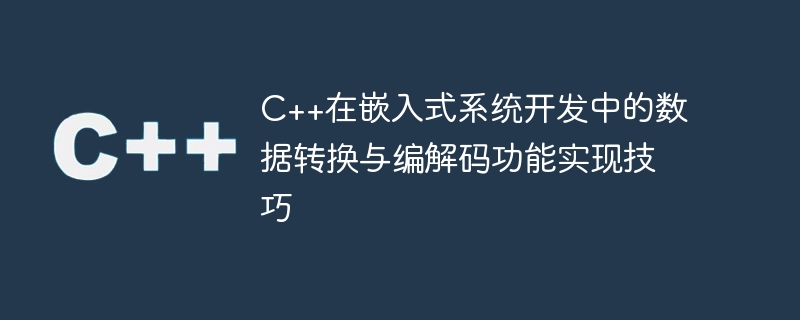임베디드 시스템 개발에서의 C++ 데이터 변환 및 인코딩 및 디코딩 기능 구현 기술
- WBOYWBOYWBOYWBOYWBOYWBOYWBOYWBOYWBOYWBOYWBOYWBOYWB원래의
- 2023-08-26 17:24:241297검색

임베디드 시스템 개발에서의 C++ 데이터 변환 및 인코딩 및 디코딩 기능 구현 기술
임베디드 시스템 개발에서 데이터 변환과 인코딩 및 디코딩은 매우 중요한 기능 중 하나입니다. 데이터를 한 형식에서 다른 형식으로 변환하든, 전송 및 저장을 위해 데이터를 인코딩 및 디코딩하든, 이를 달성하려면 효과적인 기술과 알고리즘이 필요합니다. 임베디드 시스템 개발에 널리 사용되는 프로그래밍 언어인 C++는 데이터 변환과 인코딩 및 디코딩 기능 구현을 지원하는 풍부한 라이브러리와 도구를 제공합니다.
아래에서는 C++에서 데이터 변환과 인코딩 및 디코딩을 구현하는 몇 가지 일반적인 기술을 소개하고 해당 코드 예제를 첨부합니다.
1. 데이터 유형 변환
임베디드 시스템 개발에서는 다양한 데이터 유형을 변환해야 하는 경우가 많습니다. 예를 들어 정수를 문자열로 변환하고, 문자열을 정수로 변환하고, 부동소수점을 정수로 변환하는 등의 작업을 수행합니다. C++에서는 이러한 변환 작업을 지원하는 일부 라이브러리를 제공합니다.
- 정수와 문자열의 변환
정수를 문자열로 변환하려면 ostringstream 클래스를 사용할 수 있습니다. 다음은 샘플 코드입니다.
#include <iostream>
#include <sstream>
int main() {
int num = 123;
std::ostringstream oss;
oss << num;
std::string str = oss.str();
std::cout << "Integer to string: " << str << std::endl;
return 0;
}문자열을 정수로 변환하려면 istringstream 클래스를 사용할 수 있습니다. 다음은 샘플 코드입니다.
#include <iostream>
#include <string>
#include <sstream>
int main() {
std::string str = "123";
std::istringstream iss(str);
int num;
iss >> num;
std::cout << "String to integer: " << num << std::endl;
return 0;
}- 부동 소수점 숫자를 정수로 변환
부동 소수점 숫자를 정수로 변환하려면 유형 캐스트 연산자를 사용할 수 있습니다. 다음은 샘플 코드입니다.
#include <iostream>
int main() {
double num = 3.14;
int integer = static_cast<int>(num);
std::cout << "Double to integer: " << integer << std::endl;
return 0;
}정수를 부동 소수점 숫자로 변환하려면 유형 변환 연산자를 사용할 수 있습니다. 다음은 샘플 코드입니다.
#include <iostream>
int main() {
int integer = 3;
double num = static_cast<double>(integer);
std::cout << "Integer to double: " << num << std::endl;
return 0;
}2. 인코딩 및 디코딩
임베디드 시스템에서는 전송 및 저장을 위해 데이터를 인코딩하고 디코딩해야 하는 경우가 많습니다. 예를 들어 데이터 압축 및 압축 해제, 데이터 암호화 및 해독 등이 가능합니다. C++에서는 이러한 인코딩 및 디코딩 작업을 지원하는 일부 라이브러리를 제공합니다.
- 데이터 압축 및 압축 풀기
C++에서는 zlib 라이브러리를 사용하여 데이터 압축 및 압축 풀기를 수행할 수 있습니다. 다음은 샘플 코드입니다.
#include <iostream>
#include <string>
#include <cstring>
#include <zlib.h>
std::string compress(const std::string& str) {
z_stream zs;
memset(&zs, 0, sizeof(zs));
if (deflateInit(&zs, Z_DEFAULT_COMPRESSION) != Z_OK) {
return "";
}
zs.next_in = (Bytef*)(str.c_str());
zs.avail_in = str.size() + 1;
char outbuffer[32768];
std::string outstring;
do {
zs.next_out = reinterpret_cast<Bytef*>(outbuffer);
zs.avail_out = sizeof(outbuffer);
if (deflate(&zs, Z_FINISH) == Z_STREAM_ERROR) {
deflateEnd(&zs);
return "";
}
outstring.append(outbuffer, sizeof(outbuffer) - zs.avail_out);
} while (zs.avail_out == 0);
deflateEnd(&zs);
return outstring;
}
std::string decompress(const std::string& str) {
z_stream zs;
memset(&zs, 0, sizeof(zs));
if (inflateInit(&zs) != Z_OK) {
return "";
}
zs.next_in = (Bytef*)(str.c_str());
zs.avail_in = str.size();
char outbuffer[32768];
std::string outstring;
do {
zs.next_out = reinterpret_cast<Bytef*>(outbuffer);
zs.avail_out = sizeof(outbuffer);
if (inflate(&zs, 0) == Z_STREAM_ERROR) {
inflateEnd(&zs);
return "";
}
outstring.append(outbuffer, sizeof(outbuffer) - zs.avail_out);
} while (zs.avail_out == 0);
inflateEnd(&zs);
return outstring;
}
int main() {
std::string str = "Hello, World!";
// 压缩
std::string compressed = compress(str);
std::cout << "Compressed: " << compressed << std::endl;
// 解压缩
std::string decompressed = decompress(compressed);
std::cout << "Decompressed: " << decompressed << std::endl;
return 0;
}- 데이터 암호화 및 암호 해독
C++에서는 openssl 라이브러리를 사용하여 데이터 암호화 및 암호 해독을 구현할 수 있습니다. 다음은 샘플 코드입니다.
#include <iostream>
#include <string>
#include <openssl/aes.h>
#include <openssl/rand.h>
std::string encrypt(const std::string& key, const std::string& plain) {
std::string encrypted;
AES_KEY aesKey;
if (AES_set_encrypt_key(reinterpret_cast<const unsigned char*>(key.c_str()), 128, &aesKey) < 0) {
return "";
}
int len = plain.length();
if (len % 16 != 0) {
len = (len / 16 + 1) * 16;
}
unsigned char outbuffer[1024];
memset(outbuffer, 0, sizeof(outbuffer));
AES_encrypt(reinterpret_cast<const unsigned char*>(plain.c_str()), outbuffer, &aesKey);
encrypted.assign(reinterpret_cast<char*>(outbuffer), len);
return encrypted;
}
std::string decrypt(const std::string& key, const std::string& encrypted) {
std::string decrypted;
AES_KEY aesKey;
if (AES_set_decrypt_key(reinterpret_cast<const unsigned char*>(key.c_str()), 128, &aesKey) < 0) {
return "";
}
unsigned char outbuffer[1024];
memset(outbuffer, 0, sizeof(outbuffer));
AES_decrypt(reinterpret_cast<const unsigned char*>(encrypted.c_str()), outbuffer, &aesKey);
decrypted.assign(reinterpret_cast<char*>(outbuffer));
return decrypted;
}
int main() {
std::string key = "1234567890123456";
std::string plain = "Hello, World!";
// 加密
std::string encrypted = encrypt(key, plain);
std::cout << "Encrypted: " << encrypted << std::endl;
// 解密
std::string decrypted = decrypt(key, encrypted);
std::cout << "Decrypted: " << decrypted << std::endl;
return 0;
}이 기사에서는 임베디드 시스템 개발에서 C++의 데이터 변환과 인코딩 및 디코딩을 위한 몇 가지 일반적인 기술을 소개하고 관련 코드 예제를 제공합니다. 임베디드 시스템 개발에 종사하는 개발자들에게 도움이 되기를 바랍니다.
위 내용은 임베디드 시스템 개발에서의 C++ 데이터 변환 및 인코딩 및 디코딩 기능 구현 기술의 상세 내용입니다. 자세한 내용은 PHP 중국어 웹사이트의 기타 관련 기사를 참조하세요!

